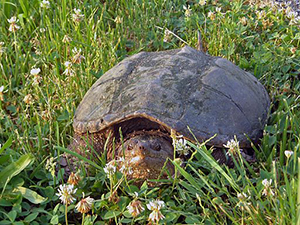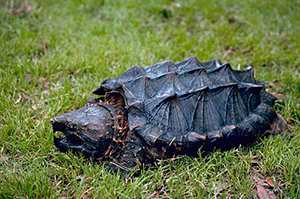Snapping Turtles in RTP
By Environmental Management System
September, 2014

Photo courtesy of U.S Fish and Wildlife Services - Northeast Region
Recently, members of the Safety and Environmental Protection Branch (SEPB) spotted an alligator snapping turtle in Discovery Lake near the Memorial Garden. It was about 24 inches across and likely weighed about 50 pounds, with three distinctive rows of spikes on its back, similar to that of an alligator.
The alligator snapping turtle (Macroclemys temminckii) is found across the southeast United States. This turtle is considered the largest North American fresh water turtle, with males sometimes weighing more than 200 pounds. Mature females are usually less than 100 pounds.
Alligator snappers have been known to live 100 years in captivity. This turtle spends most of its life in fresh water, and often the turtles end up completely covered in algae to help it blend into its surroundings. While alligator snappers eat small mammals, reptiles, fish, amphibians, birds, and aquatic plants, they use a fleshy appendage on their tongue called a vermiform to attract food into their open mouths instead of hunting it.

Photo courtesy of Gary Stolz, U.S Fish and Wildlife Service
Females only leave the water to nest, where they will then lay between 10 and 50 eggs that will then incubate for at least 100 days. The sex of the hatchlings depends on the incubation temperature; extreme temperatures favor female hatchlings while moderate seasonal temperatures favor males. The young snappers are fast, but as they grow larger, they are not able to move as fast.
While full size alligator snappers have no known predators, they have become vulnerable and are approaching extinction in many areas due to exploitation of nests, collection, and lost habitats. In some places, they are still hunted for their meat. The alligator snapping turtle is less aggressive than the common snapping turtle (Chelydra serpentina), which does not have three spiky ridges on their shell. However, they are still aggressive, and with a flexible and extendable neck, they can reach farther than it might appear. Any snapper should be handled with respect and care, since they can inflict serious injury. If you see an alligator snapper, or any other unexpected wildlife in Discovery Lake, notify a member of SEPB.



